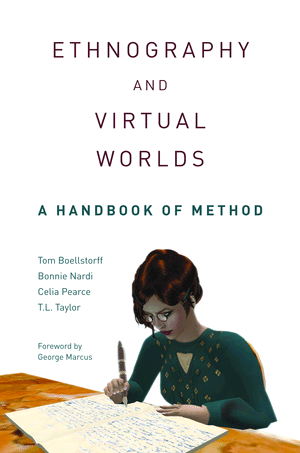What does it mean to be an avatar? Or should we say to ‘have’ an avatar? And what is an avatar: the thumbnail on a Twitter of Facebook account? The 3D characters in World of Warcraft or in Second Life? The textual description of a character in a text-only roleplaying environment?
In a comment on ‘The Metaverse is dead, long live shared creative spaces’, Caliburn Susanto says:
There are those of us (definitely a minority) who acclimate quickly to enjoying the 3-D online environment AS an avatar (as opposed to USING an avatar). Some people — the “niche market†everyone speaks of — have a Gestalt moment early on when the avatar stops being “it†(a cursor with arms and legs) and becomes “me.†From that point forward the humanity comes through and immersion becomes possible. The person’s character and emotions flow through his or her individualized puppet and the environment stops being a game (for lack of a better term) and becomes a place, a world. For most people (and I’ve tried with friends and acquaintances with very little success!) such immersion is foreign and even unpleasant.
I have the feeling that representation of self in digital environments is important – but how to learn more about it? One way to study this could be ethnography, so I bought Ethnography and Virtual Worlds, by Tom Boellstorff, Bonnie Nardi, Celia Pearce and T.L. Taylor.
The publishers at Princeton University Press say this is a concise, comprehensive, and practical guide for students, teachers, designers, and scholars interested in using ethnographic methods to study online virtual worlds, including both game and nongame environments.
The focus of the handbook is on ‘virtual worlds’, meaning:
– places that have a sense of worldliness
– multi-user (shared environments, synchronous communication and interaction)
– persistent (they continue to exist also when players log off)
– allowing players to embody themselves (usually as avatars)
Which means that for instance Facebook is not a virtual world, because of the lack of worldliness and embodiment (even though in Facebook or linked to Facebook there are virtual worlds). So a possible tension is that the results of research in for instance Second Life are only relevant to that particular environment (or maybe even relevant to specific communities in that world). So will such research learn us something about for instance online collaborative learning on forums and blogs, rather than in a virtual world as defined above?
Chapter One, Why this Handbook, concludes by saying:
Many of the many contributions of virtual world ethnography is to broaden this conversation by showing how forms of technologically mediated sociality shape and are shaped by the contemporary context.
Which sounds nice, but the question remains: will data about how people use avatars in World of Warcraft learn us something beyond World of Warcraft? If I find out, I’ll post it here – and don’t hesitate sharing your experiences in this regard!



That comment stood out to me, too, it expressed my experience trying to introduce others to virtual worlds very well. I wonder what it is that makes us open to experiencing an environment through an avatar that others find distasteful or hokey? I haven’t figured it out yet, but I agree it’s a crucial and important point in the discussion.
Look forward to hearing your thoughts on the ethnography book. It’s on my “to read” list, but I promised myself no more new books until I plow through the ones I already have. 🙂
I think ethnographic research can help us to understand better what it means being an avatar or having one in different contexts, but then of course there is also psychology. I guess identities never are totally self-evident and are always complex constructions, maybe avatars make people uncomfortably aware of that…
The problem I have always faced in doing real life work in virtual worlds is getting people to not see it as a game. They instantly think it’s a silly game and don’t see it for the powerful platform that it could be.
Maybe it depends on the way the avatars are dressed and the venue? Then again, imitating a boring business-like place is maybe not a good idea – maybe for brainstorming purposes it’s more interesting to meet in a tree hut. It depends on the kind of meeting you want to have.
Thanks for the shoutout! In regard to your question “will data about how people use avatars in World of Warcraft learn us something beyond World of Warcraft?” To me, this is about all ethnography and all research. It always focuses on X, and then from that you learn something about more than X but it’s always relative. So you could ask “will data about how gay Indonesians live their lives learn us something beyond gay Indonesia?” To which my answer would be (based on my two books about gay Indonesians): #1 yes, #2 and why aren’t gay Indonesians valuable to understand for their own sake anyway? So this is one of many cases where the issue isn’t specific to online stuff: it’s about the general issue of scoping claims, generalizability, and what it means to conduct research at all! All important issues and thanks for bringing them up…
Thank you for your reaction!